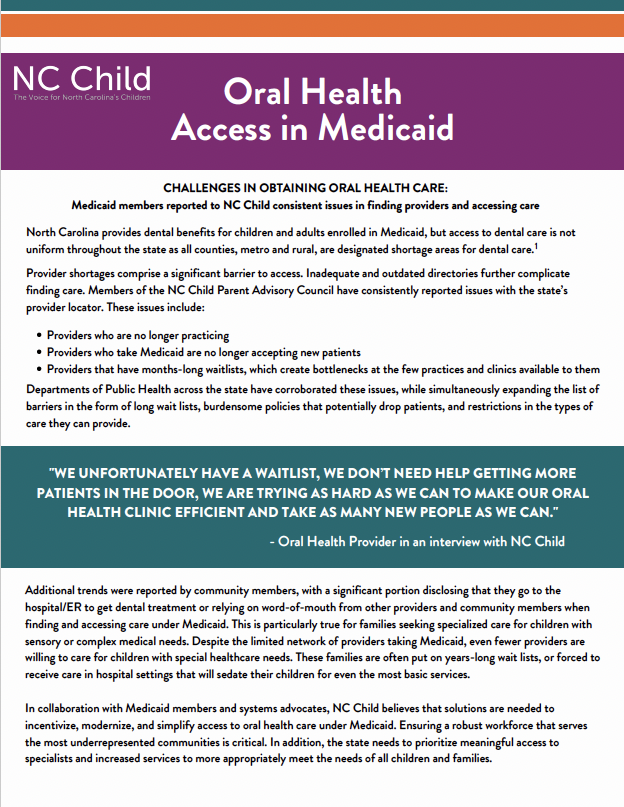Medicaid members reported to NC Child consistent issues in finding providers and accessing care.
Provider shortages comprise a significant barrier to access. Inadequate and outdated directories further complicate finding care. Members of the NC Child Parent Advisory Council have consistently reported issues with the state’s provider locator. These issues include:
- Providers who are no longer practicing
- Providers who take Medicaid are no longer accepting new patients
- Providers that have months-long waitlists, which create bottlenecks at the few practices and clinics available to them
Departments of Public Health across the state have corroborated these issues, while simultaneously expanding the list of barriers in the form of long wait lists, burdensome policies that potentially drop patients, and restrictions in the types of care they can provide.
“We unfortunately have a waitlist, we don’t need help getting more patients in the door, we are trying as hard as we can to make our oral health clinic efficient and take as many new people as we can.” -Oral Health Provider in an interview with NC Child
Additional trends were reported by community members, with a significant portion disclosing that they go to the hospital/ER to get dental treatment or relying on word-of-mouth from other providers and community members when finding and accessing care under Medicaid. This is particularly true for families seeking specialized care for children with sensory or complex medical needs. Despite the limited network of providers taking Medicaid, even fewer providers are willing to care for children with special healthcare needs. These families are often put on years-long wait lists, or forced to receive care in hospital settings that will sedate their children for even the most basic services. In collaboration with Medicaid members and systems advocates, NC Child believes that solutions are needed to incentivize, modernize, and simplify access to oral health care under Medicaid. Ensuring a robust workforce that serves the most underrepresented communities is critical. In addition, the state needs to prioritize meaningful access to specialists and increased services to more appropriately meet the needs of all children and families.
Key Recommendations
Design the Medicaid System so that it is easy for providers to use.
- Policy Recommendation: Increase Medicaid payment rates to retain providers, suport innovative care, and enhance access to specialty services, including for those with special health needs.
- Policy Recommendation: NC Medicaid should compensate providers for providing high quality patient-centered and whole personoral health care.
- Policy Recommendation: Support state and school incentive programs like loan forgiveness for graduating providers to work in public health or in Federally Qualified Health Centers.
Increase the number and improve distribution of dentists in North Carolina with focus on Medicaid-serving and rural practices.
-
Policy Recommendation: Support state and school incentive programs such as loan forgiveness for graduating providers to serve rural communities for 3-5 years.
- Policy Recommendation: Provide enhanced rates for providing care in rural and/or significantly underserved communities, including serving children with special health care needs.
Endnotes:
1 Rural Health Information Hub. (2022). Rural Data Explorer – Rural Health Information Hub. Rural Data Explorer.https://www.ruralhealthinfo.org/data-explorer?id=208&state=NC
Download
